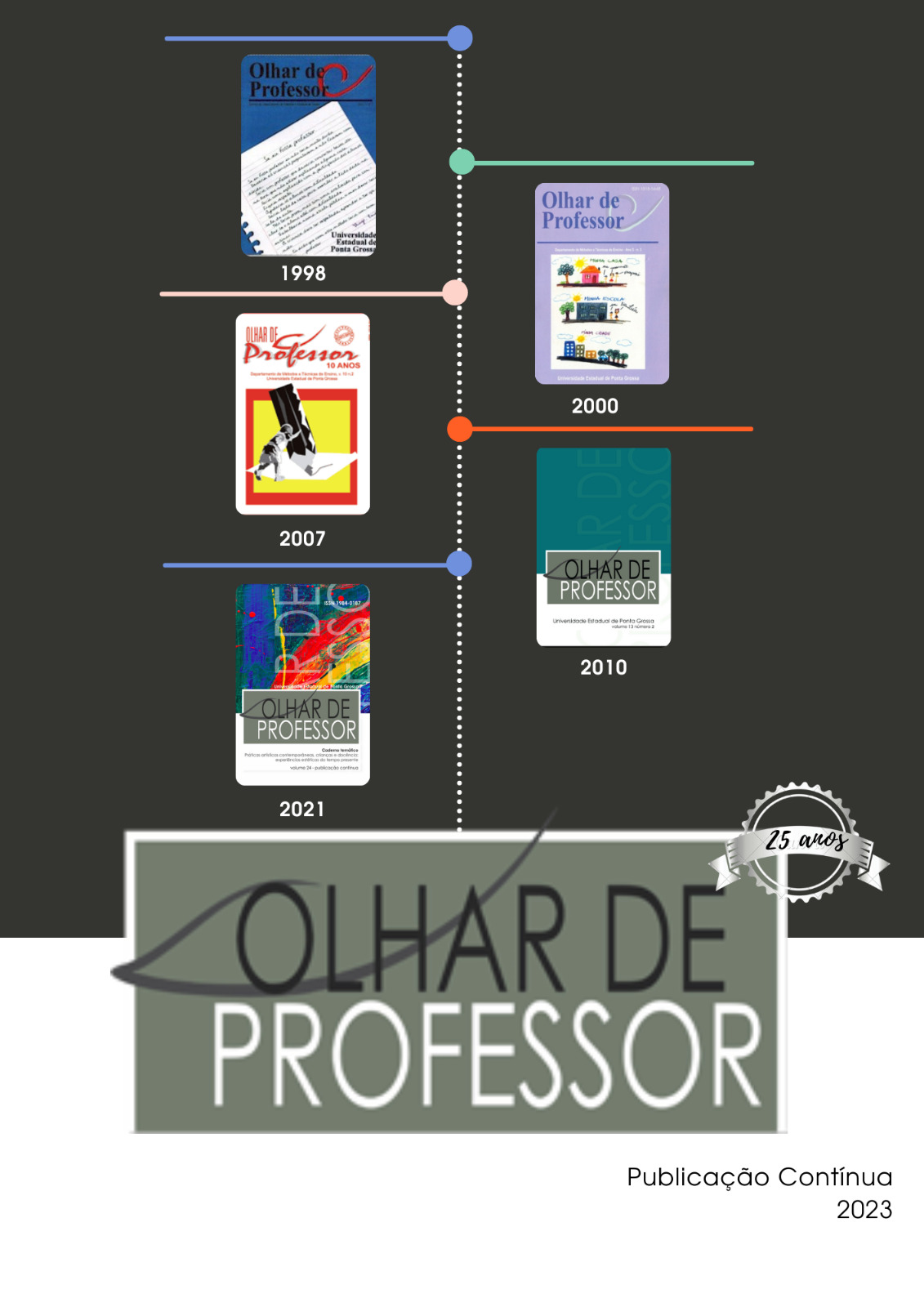A Cultura Digital na sala de aula: a reconfiguração dos processos de escolarização e as novas possibilidades do fazer docente
Conteúdo do artigo principal
Resumo
Atualmente, um número, cada vez maior, de indivíduos estão conectados à rede mundial de computadores e parte considerável das informações que acessamos são disponibilizadas em ambientes virtuais. Este processo impacta, consideravelmente, como produzimos novos conhecimentos e, consequentemente, interfere nas dinâmicas estabelecidas no interior das escolas. Partindo deste cenário, construímos este ensaio. Nosso objetivo é entender como as novas tecnologias informacionais e, consequentemente, a cultura digital, interfere nas práticas de ensino estabelecidas na Educação Básica. Por se tratar de um ensaio, não objetivamos a construção de argumentos definitivos ou a exposição de uma análise conclusiva a respeito da relação entre as novas tecnologias, a cultura digital e as instituições escolares. O que procuramos, por meio de uma revisão de literatura, é estimular o olhar, a capacidade de observação, e incentivar os docentes a perceberem o potencial formativo presente na utilização de metodologias de ensino que incorporem a cultura digital.
Downloads
Detalhes do artigo

Este trabalho está licenciado sob uma licença Creative Commons Attribution 4.0 International License.
Autores que publicam nesta revista concordam com os seguintes termos:
a) Os autores mantêm os direitos autorais e concedem à revista o direito de primeira publicação, com o trabalho simultaneamente licenciado sob a Creative Commons Attribution License Atribuição 4.0 Internacional (CC BY 4.0) que permite o compartilhamento do trabalho com reconhecimento da sua autoria e publicação inicial nesta revista.
b) Os autores são autorizados a assinarem contratos adicionais, separadamente, para distribuição não exclusiva da versão publicada nesta revista (por exemplo, em repositórios institucionais ou capítulos de livros), com reconhecimento da sua autoria e publicação inicial nesta revista).
c) Os autores são estimulados a publicar e distribuir a versão onlline do artigo (por exemplo, em repositórios institucionais ou em sua página pessoal), considerando que isso pode gerar alterações produtivas, bem como aumentar o impacto e as citações do artigo publicado.
d) Esta revista proporciona acesso público a todo o seu conteúdo, uma vez que isso permite uma maior visibilidade e alcance dos artigos e resenhas publicados. Para maiores informações sobre esta abordagem, visite Public Knowledge Project, projeto que desenvolveu este sistema para melhorar a qualidade acadêmica e pública da pesquisa, distribuindo o OJS assim como outros softwares de apoio ao sistema de publicação de acesso público a fontes acadêmicas.
e) Os nomes e endereços de e-mail neste site serão usados exclusivamente para os propósitos da revista, não estando disponíveis para outros fins.
______________

Este obra está licenciado com uma Licença Creative Commons Atribuição 4.0 Internacional.
Referências
BRASIL. Base Nacional Comum Curricular. Brasília: Ministério da Educação, 2018. Disponível em: http://basenacionalcomum.mec.gov.br/a-base. Acesso em: 11 nov. 2021.
BELCHIOR. Velha Roupa Colorida. Alucinação. Rio de Janeiro. Phillips – Polygram, 1976. Faixa 2. Disco de Vinil - LP.
CASTELLS, M. A Sociedade em Rede. São Paulo: Paz e Terra, 2006.
CANCLINI, N. O mundo inteiro como lugar estranho. São Paulo: Editora da Universidade de São Paulo, 2016.
COSENZA, M. Neurociência e Educação: como o cérebro aprende. Porto Alegre: Artmed, 2011.
DELEUZE, G. Conversações. São Paulo: Editora 34, 1992.
FOUCAULT, M. Vigiar e Punir: história da violência nas prisões. Petrópolis: Editora Vozes, 1987.
DIGITAL 2022: GLOBAL OVERVIEW REPORT. 26 de janeiro de 2022. Disponível em <https://datareportal.com/reports/digital-2022-global-overview-report>. Acesso em: 02 de maio de 2022.
HAN, B. Sociedade do cansaço. Petrópolis, RJ: Vozes, 2017.
HUI, Y. Tecnodiversidade. São Paulo: Ubu Editora, 2020.
KRAUSKOPF, D. Dimensiones críticas en la participación social de las juventudes. La participación Social e Política de los Jóvenes en el Horizonte del nuevo siglo. BALARDINI, S. Colección grupos de trabajo CLACSO, Buenos Aires, Argentina, 2002.
L'ECUYER, C. Educar na curiosidade: como educar num mundo frenético e hiperexigente? Lisboa: Planeta Manuscrito, 2017.
LEE, K. Inteligência artificial: como os robôs estão mudando o mundo, a forma como amamos, nos relacionamos, trabalhamos e vivemos. Rio de Janeiro: Globo Livros, 2019.
LÉVY, P. Cibercultura. São Paulo: Editora 34, 1999.
LIPOTEVSKY, G. A estetização do mundo: viver na era do capitalismo artista. São Paulo: Companhia das Letras, 2015.
MARINO, L. A falência do modelo escolar tradicional e a necessária construção de uma educação integral e comunitária. Revista Giramundo. Rio de Janeiro, V. 5, no 10, 2018. p. 19-30.
MARINO, L. A cidade e seus caminhos: o espaço urbano como currículo e itinerário formativo. Revista Ensino de Geografia. Recife, V.4, no 3, 2021, p. 231-248.
MCLUHAN, M. Os meios de comunicação como extensões do homem. São Paulo: Cultrix, 2007.
MORAN, J. BACICH, L. (orgs,). Metodologias ativas para uma educação inovadora: uma abordagem téorico-prática. Porto Alegre: Penso, 2018.
MOROZOV, E. Big Tech: a ascensão dos dados e a morte da política. São Paulo: Ubu Editora, 2018.
PAPERT, S. A Máquina das Crianças: Repensando a Escola na Era da Informática. Porto Alegre: Artes Médicas, 1994.
PARISER, E. O filtro invisível: o que a internet está escondendo de você. São Paulo: Zahar, 2012.
RESNICK, M. Jardim de infância para a vida toda: por uma aprendizagem criativa, mão na massa e relevante para todos. Porto Alegre: Penso, 2020.
REVISTA PEQUENAS EMPRESAS & GRANDES NEGÓCIOS. Exclusivo: Descomplica terá graduação online com mensalidade de até R$ 219. 10 de março de 2020. Disponível em: <https://revistapegn.globo.com/Startups/noticia/2020/03/exclusivo-descomplica-tera-graduacao-online-com-mensalidade-de-ate-r-219.html>. Acesso em: 02 de maio de 2022.
RIFKIN, J. Sociedade com custo marginal zero. São Paulo: M. Books do Brasil Editora Ltda, 2016.
SIBILIA, P. Redes ou paredes: a escola em tempos de dispersão. Rio de Janeiro: Contraponto, 2012.
SILVA, M. Educar na cibercultura: desafios à formação de professores para docência em cursos online. Revista Digital de Tecnologias Cognitivas. São Paulo: Pontifícia Universidade Católica de São Paulo - Programa de Pós-graduação em Tecnologia da Inteligência e Design Digital, no 3, Jan./Jun, 2010. pp.36-51.
VEIGA-NETO, A. Disciplina e controle na escola: do aluno dócil ao aluno flexível. Anais do IV Colóquio luso-brasileiro sobre questões curriculares. Florianópolis: UFSC, 2008. p. 1-18.





